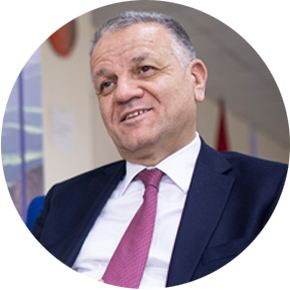In February this year the European Union's Trade Policy Committee has unanimously decided to launch negotiations on a Deep and Comprehensive Free Trade Agreement (DCFTA) with Armenia. This agreement will largely eliminate trade barriers between the two sides, but the precondition is that Armenia’s economy has to undergo considerable quality changes. DCFTA talks with the EU will start in June, but a preparatory meeting, a so called, «zero round» on the subject has already been held in Brussels.
The Policy Advisor on Trade at the EU Advisory Group to Armenia, Willem van der Geest explained in an interview to Mediamax and Banks.am portal, what changes are going to take place in Armenia's economy and how long this will take.
- Negotiations are starting between the EU and Armenia on a DCFTA agreement. How do you evaluate this stage of the negotiations and what questions are on the agenda?
- It’s absolutely right to say that the DCFTA negotiations are now starting. In 2009 the European Commission came with a very large fact finding mission to Armenia. They identified a whole number of areas, and then 3 areas were taken as key priorities. These were: technical barriers to trade, sanitary and phytosanitary standards, as well as intellectual property rights. So the preparation has been going on for about three years, but on the 3-rd of May the first official, they call it «zero round» was held, it's really a preparatory meeting, during which it's discussed how these negotiations are done, what are the areas that will be covered etc.
It took place in Brussels, and the official first round of the negotiations will take place in the middle of June in Brussels. It's too early to evaluate them at this stage. But the start of these negotiations was very constructive and positive. I think there is a good understanding between the EU and Armenia.
- During your recent lecture at Russian-Armenian University you said that these negotiations can last for 3 years or more, depending on the speed at which Armenia implements economic reforms. There are actually some reforms taking place in the fields of food security, taxes and customs, antimonopoly regulation etc. In your opinion, will Armenia manage to reach the agreement in three years or this will become a longer story?
- I think that 3 years is a realistic estimate. To say it can be done shorter is not realistic because there are many areas to be tackled. But fortunately Armenia already has quite a simple structure of customs tariffs, so shift will take place relatively easy. It’s not such a large economy, so in that sense I think 3 years is a realistic estimate, it’s definitely possible.
- Does this transition suppose more legislative or administrative changes?
- A number of legislative changes have to take place, some institutions must become stronger and there has to be good implementation. In some areas, like, for example food safety, the work has already started: the government adopted a strategy for food safety in November 2011 and the work is already going on. In other areas work is still starting. For example very little has yet been done in the area of trade in services.
So those areas still need to be tackled during the negotiations. And for some sectors where the changes are quite far reaching, more time is needed for complying with international standards, so there will be transition time after DCFTA comes into effect. For example certain industries will be given 2-3 years after the signing of DCFTA to comply with those standards.
- It seems that economic reforms in Armenia are taking place slowly. When we compare economic reforms in Armenia and Georgia, it seems that although the same reforms are taking place in both countries, in Georgia they're taking place much faster than here. What’s your opinion?
- It's fair to say that the reforms are going a bit slowly, but it's not unusual. If we compare it to when a number of Central and Eastern European countries joined EU, like Bulgaria and Romania, it also took quite a number of years to pass the necessary legislative changes, make the necessary reorganization of the government agencies, so it's slow but not unusual.
I don't really know enough about Georgia to compare, but it's true that some reforms were quite swift there, especially in 2004 and 2005. But there’s a perception from the international observation, that some of the reforms there have not given the expected results. So sometimes it's better to go a bit slower but do it properly rather than do kind of popular movements and later find out that it doesn't work. So, as long as there's tangible and steady progress, a gradual approach is OK.
- One of the major preconditions for DCFTA is free economic competitiveness in the internal market and strict regulation of monopolies. How is this process going to take place? What is Europe's, or, perhaps, world's best practice of stopping monopolies, especially when, and that's not a secret in Armenia, many of them are merged with the authorities?
- Pushing monopolies back is crucial. In every economy, whether it's French or German, Armenia or Georgian, there are monopolies. There are certain monopolies that are called natural monopolies, because they're based on the networks, for example, airport, natural gas and electricity distribution, water, railway etc. They will always stay throughout the world. The key is that they are regulated. And the regulation must be such that a new entrepreneur can enter and use those networks.
- But in Armenia there are dozens of unnatural monopolies. How should they be dealt with?
- Here the issue of competition policy comes in. Entrepreneurs that wish to enter into a particular field, for example importing foodstuff, mobile phones, cars etc., must be sure that they're not hindered by existing operators.
In European Union we have the Directorate General for Competition, which analyzes whether there are instances of price fixing between colluding groups or unfair competition, and they give major fines. There’s famous example of Microsoft: European Commission fined Microsoft for $ 500 mln, because of the way they were handling their Internet Explorer. There are cases of even larger fines: Glass producers in France, Germany and Japan fixed the price amongst them, which is forbidden. The Commission found the evidence of that price fixing, it was a cartel, and they gave enormous fines: some €1.5 bln was to be paid by 3 companies, which were smashed.
So what is important for Armenia is that the State Commission for Protecting Economic Competition (SCPEC) has sufficient powers to take those kinds of actions. They must have access to the accounts of companies that they suspect. For example they must be able to do surprise inspections. If they find that there is collusion, the penalty has to be so high, that the lawbreaker will not contemplate to do it again.
Of course we know that companies will always try to make deals under the table. This is why the regulator needs to be stronger. And this is an example of legislative and institutional change that will have to take place in Armenia to deal with this problem.
We cannot expect all monopolies to disappear overnight. It will take a long time, because they’re strong and entrenched, maybe through corruption and bribery they get certain officials or administrations to help them, so I think that anticorruption drive has to be also part of these measures. It’s a whole package, it’s not only competition policy, you need several related measures.
- What will actually change for an average Armenian firm, which is in trade relations with EU, after Armenia joins the DCFTA? What will change for EU resident companies, trading with or investing in Armenia and what will change for an average Armenian citizen?
- Armenian firms in general will have better access to the European markets. So if they are exporting they'll find it easier to get into the European market. If they're dependent on inputs they import from Europe, they will find it easier to bring them into the country, so that will make them more competitive. There is small number of Armenian companies that are exporting to Europe but virtually every company is importing from Europe. About half of total imports come from the EU.
What will change for EU resident companies: the DCFTA Chapter that will deal with services and investment will treat European companies the same way it treats Armenian national companies. So, they will find it easier to operate here. It will be more attractive and also more secure. So there'll be increase of investment, because of this change of regulations, which is good for Armenia from the growth point of view.
It will take time for an average Armenian citizen to feel the change, because we’re talking about time frame of 5-7 years until the changes take effect. But in the longer term there’ll be a greater choice of goods in the markets. Goods will be somewhat cheaper because there will be less barriers on their entry. Of course the increase of exports will also lead to greater employment opportunities, so there will be more jobs.
- Some Armenian businessmen doubt that DCFTA will somehow make it more difficult to do business in Armenia. What’s your opinion?
- I think that it's a misunderstanding and we are trying to explain it. Of course some industries will have to upgrade the quality of their production in order to get into foreign markets. This is the globalization; you cannot stay with low standards. People in Armenia don't want low standards either. Of course this is a challenge for many industries, but if they don't invest they will lose. And this is why we're talking about transition period, so we don't do it overnight and the industries will have from 2 to 5 years to improve their technology after the new regulations are adopted.
For example, we say, that we want higher standards for food safety. This is also demand from ordinary consumers in Armenia, but at the same time this is a requirement for entering the EU market. So companies have to invest to meet those standards. There's no another way.
Ruben Harutyunian talked to Willem van der Geest.


























Comments
Dear visitors, You can place your opinion on the material using your Facebook account. Please, be polite and follow our simple rules: you are not allowed to make off - topic comments, place advertisements, use abusive and filthy language. The editorial staff reserves the right to moderate and delete comments in case of breach of the rules.